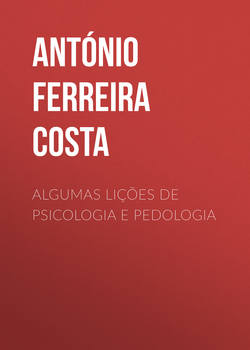Algumas lições de psicologia e pedologia

Реклама. ООО «ЛитРес», ИНН: 7719571260.
Оглавление
António Ferreira Aurélio da Costa. Algumas lições de psicologia e pedologia
CHAPTER I. GENERAL REMARKS
CHAPTER II. WHAT UTILITARIANISM IS
CHAPTER III. OF THE ULTIMATE SANCTION OF THE PRINCIPLE OF UTILITY
CHAPTER IV. OF WHAT SORT OF PROOF THE PRINCIPLE OF UTILITY IS SUSCEPTIBLE
CHAPTER V. ON THE CONNEXION BETWEEN JUSTICE AND UTILITY
Отрывок из книги
A passing remark is all that needs be given to the ignorant blunder of supposing that those who stand up for utility as the test of right and wrong, use the term in that restricted and merely colloquial sense in which utility is opposed to pleasure. An apology is due to the philosophical opponents of utilitarianism, for even the momentary appearance of confounding them with any one capable of so absurd a misconception; which is the more extraordinary, inasmuch as the contrary accusation, of referring everything to pleasure, and that too in its grossest form, is another of the common charges against utilitarianism: and, as has been pointedly remarked by an able writer, the same sort of persons, and often the very same persons, denounce the theory "as impracticably dry when the word utility precedes the word pleasure, and as too practicably voluptuous when the word pleasure precedes the word utility." Those who know anything about the matter are aware that every writer, from Epicurus to Bentham, who maintained the theory of utility, meant by it, not something to be contradistinguished from pleasure, but pleasure itself, together with exemption from pain; and instead of opposing the useful to the agreeable or the ornamental, have always declared that the useful means these, among other things. Yet the common herd, including the herd of writers, not only in newspapers and periodicals, but in books of weight and pretension, are perpetually falling into this shallow mistake. Having caught up the word utilitarian, while knowing nothing whatever about it but its sound, they habitually express by it the rejection, or the neglect, of pleasure in some of its forms; of beauty, of ornament, or of amusement. Nor is the term thus ignorantly misapplied solely in disparagement, but occasionally in compliment; as though it implied superiority to frivolity and the mere pleasures of the moment. And this perverted use is the only one in which the word is popularly known, and the one from which the new generation are acquiring their sole notion of its meaning. Those who introduced the word, but who had for many years discontinued it as a distinctive appellation, may well feel themselves called upon to resume it, if by doing so they can hope to contribute anything towards rescuing it from this utter degradation.1
The creed which accepts as the foundation of morals, Utility, or the Greatest Happiness Principle, holds that actions are right in proportion as they tend to promote happiness, wrong as they tend to produce the reverse of happiness. By happiness is intended pleasure, and the absence of pain; by unhappiness, pain, and the privation of pleasure. To give a clear view of the moral standard set up by the theory, much more requires to be said; in particular, what things it includes in the ideas of pain and pleasure; and to what extent this is left an open question. But these supplementary explanations do not affect the theory of life on which this theory of morality is grounded – namely, that pleasure, and freedom from pain, are the only things desirable as ends; and that all desirable things (which are as numerous in the utilitarian as in any other scheme) are desirable either for the pleasure inherent in themselves, or as means to the promotion of pleasure and the prevention of pain.
.....
I have dwelt on this point, as being a necessary part of a perfectly just conception of Utility or Happiness, considered as the directive rule of human conduct. But it is by no means an indispensable condition to the acceptance of the utilitarian standard; for that standard is not the agent's own greatest happiness, but the greatest amount of happiness altogether; and if it may possibly be doubted whether a noble character is always the happier for its nobleness, there can be no doubt that it makes other people happier, and that the world in general is immensely a gainer by it. Utilitarianism, therefore, could only attain its end by the general cultivation of nobleness of character, even if each individual were only benefited by the nobleness of others, and his own, so far as happiness is concerned, were a sheer deduction from the benefit. But the bare enunciation of such an absurdity as this last, renders refutation superfluous.
According to the Greatest Happiness Principle, as above explained, the ultimate end, with reference to and for the sake of which all other things are desirable (whether we are considering our own good or that of other people), is an existence exempt as far as possible from pain, and as rich as possible in enjoyments, both in point of quantity and quality; the test of quality, and the rule for measuring it against quantity, being the preference felt by those who, in their opportunities of experience, to which must be added their habits of self-consciousness and self-observation, are best furnished with the means of comparison. This, being, according to the utilitarian opinion, the end of human action, is necessarily also the standard of morality; which may accordingly be defined, the rules and precepts for human conduct, by the observance of which an existence such as has been described might be, to the greatest extent possible, secured to all mankind; and not to them only, but, so far as the nature of things admits, to the whole sentient creation.
.....